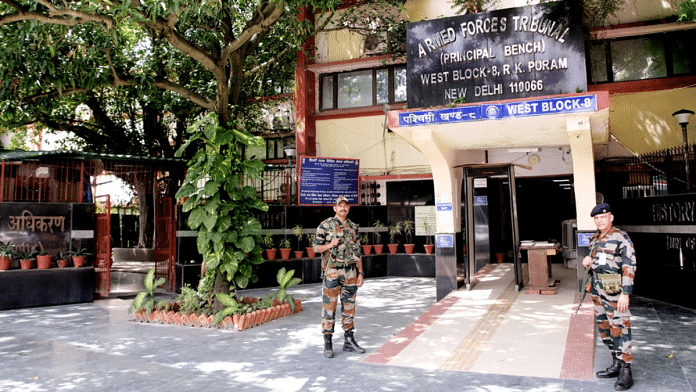New Delhi: The Bar Association of Armed Forces Tribunal’s (AFT) Chandigarh bench has decided to amplify its protest against the transfer of a judicial member.
Office bearers of the association told ThePrint that they are likely to move a judicial forum — either the High Court or the Supreme Court — against the AFT chairperson’s decision to move Justice (retd.) Dharam Chand Chaudhury to Kolkata bench.
On an indefinite strike since 26 September, the AFT Chandigarh Bar Association has demanded cancellation of the transfer order issued on 25 September. Signed by AFT chairperson Justice (retd.) Rajendra Menon, the transfer order says Justice (retd.) Chaudhary is being moved out “for administrative reasons in public interest.”
Chaudhary, who retired as the acting chief justice of Himachal Pradesh High Court, is judicial member-cum-head of the Department of the Chandigarh Bench of AFT. He joined the tribunal in September 2021.
“Shocked” at the “sudden” transfer order, the AFT Bar has criticised his ouster as “unethical and uncalled for”, and termed it as an assault on the independence of judiciary.
Though the order does not indicate the grounds for transfer, the association has alleged that the judge got the marching orders because “he refused to buckle under pressure of the Ministry of Defence (MoD) and presumably the Chairperson, who did not want uncomfortable orders to be passed against the senior functionaries of MoD”. ThePrint has a copy of the statement.
The Bar Association also wrote to Chief Justice of India (CJI) D.Y. Chandrachud, saying the judge was transferred following his strict orders against senior MoD officials. This, it added, was done to make sure the tribunal’s orders are executed and implemented.
The letter pointed out how AFT orders were lying unimplemented and that Chaudhary was ensuring compliance and adherence to the rule of law thereby saving judicial dignity. He had initiated contempt proceedings against the senior officials after they failed to comply with the tribunal’s order.
Since the association has not received any response from the CJI and from the AFT chairperson, it proposes to invoke judicial remedy to seek a stay of the transfer order.
Though transfer of judges is not subject to judicial review, this case has brought to the fore the Supreme Court’s repeated warning of executive interference in the functioning of tribunals, association members told ThePrint.
“In many judgements, the top court has directed that a separate wing under the Ministry of Finance must be created to cater to tribunals. But the same has not happened,” a member said.
As mentioned in the letter to the CJI, the association has strong apprehension that the transfer is at the behest of the MoD.
According to another member, the contempt application being heard by Justice Chaudhary’s bench is linked to a bunch of execution petitions involving more than 600 litigants, mostly senior citizens. “A perusal of his court’s causelist for 27 September would show that a number of applications demanding execution of tribunal’s orders and contempt applications were listed on that day. But due to his transfer order, he could not hear those cases,” the member said.
The association has grievances against the “hasty manner” of the transfer. Its members also feel that the ground for transfer mentioned in the order is vague and that there was no “urgency” to suddenly move him to another bench. Hence, according to them, the order is “discriminatory, arbitrary and colourable”.
The association has received backing from four prominent AFT Bar associations – Lucknow, Chennai, Jammu and Kashmir and Jaipur, who wrote letters in support of the protests against the transfer. ThePrint has a copy of all these letters.
Significantly, the Bar Association of AFT’s principal bench in Delhi has maintained a silence. When ThePrint reached out to the association’s secretary Wing Commander (retd.) Ajit Kakkar, he refused to comment on the matter.
AFT Chandigarh Bar Association’s president R.S. Panghal also declined to comment on why the principal bench’s bar association has not taken a stand. “I am surprised that it has not taken any stand so far,” Panghal told ThePrint.
This is not the first time that AFT Chandigarh Bar Association has spoken out against the executive interference in the tribunal’s functioning. In July, it took strong objection to MoD seeking details of all execution petitions pending before the Chandigarh AFT. The ministry has written a letter to the tribunal on 28 July, asking it to furnish details of all such matters. Association members said the tribunal had refused the information, citing judicial independence from MoD.
(Edited by Tony Rai)
Also Read: How independent is Armed Forces Tribunal? Army colonel’s SC plea questions defence ministry control



